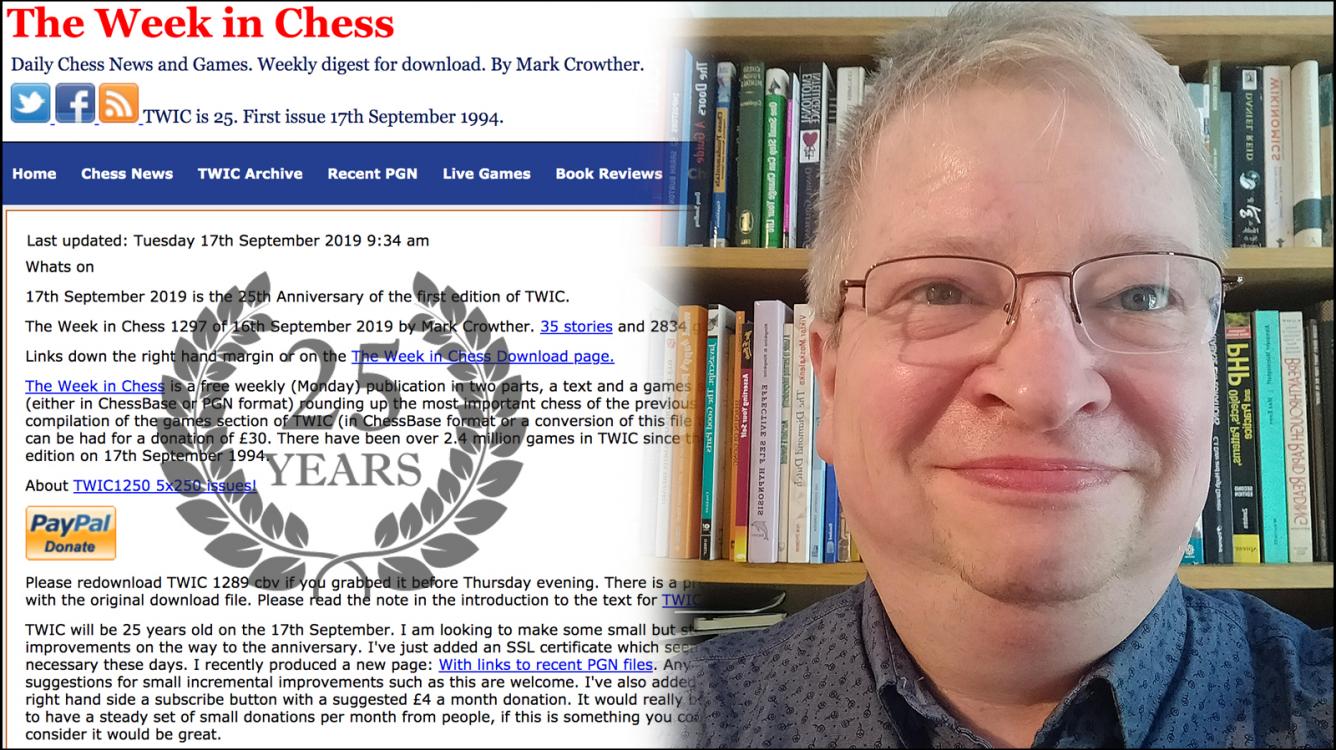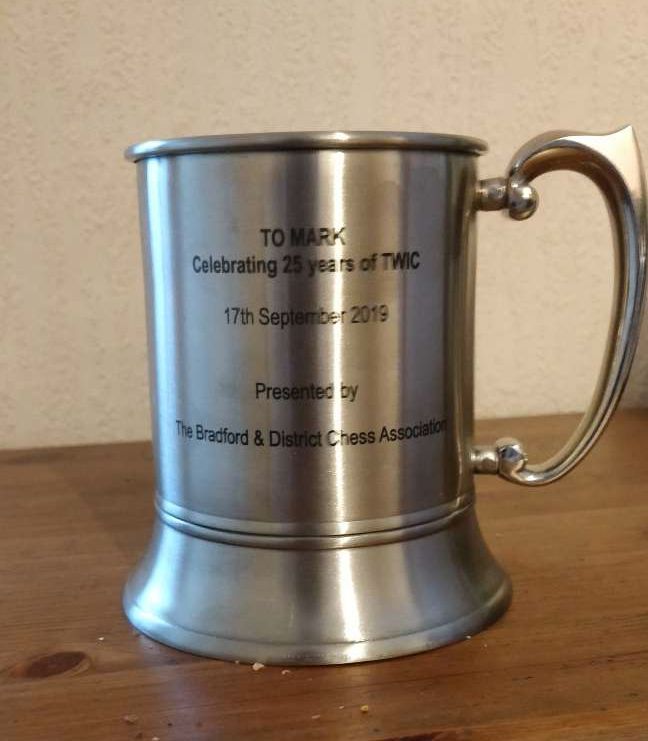
25 Years Of The Week In Chess
The Week In Chess is a household name in the chess world and still the place to find the latest chess games, altogether and nicely sorted, for download. The first issue was published 25 years ago today.
Mark Crowther, the publisher of the site, is from Clayton, a suburb of Bradford in northern England. He is always in for a chat on Skype, and a few days before the interview he said he was "looking forward to it." It characterizes the cheerful personality of the man who single-handedly changed the chess world a quarter of a century back, when he started publishing his weekly chess magazine The Week In Chess (TWIC).
"I never go to bed on a Monday without finishing TWIC. It’s unthinkable. It’s how you get it done."
—Mark Crowther
It was an early example of chess and the internet being made for each other.
Since September 17, 1994, Crowther has posted almost 1,300 issues—that round number will be out in three weeks. These days they come out on Monday nights, without exception. Apart from a few times in the early years, he hasn't missed a single week.
"I never go to bed on a Monday without finishing TWIC," Crowther said. "It’s unthinkable. It’s how you get it done."
TWIC is not just a collection of games; it's the processing that Crowther does that has added value.
"I find out where the results are going to be, I find out the dates and times of all the rounds, feed that into a computer and then I transfer them to the web," he explains. "Then I compile a list of all the players in the tournament and I find their FIDE ID number which I add to the PGN."
Crowther is proud that, these days, major chess websites include these tags in their PGN files as well.
"I think that’s one of my biggest contributions," he said. "I invented these PGN tags for FIDE IDs. For about a decade now all my PGN files have FIDE IDs so that they can easily be transformed into a database with a different naming system if necessary."
They key part of Crowther's processing is that the names of all the thousands of players are written consistently, and correctly.
"When I get the games," he said, "I compare the games with whatever naming system that organizers have against the list and make sure they match. And then I process the games against that with FIDE IDs and whatever naming system I use."
"It actually pre-dated what we would call the World Wide Web."
—Mark Crowther
Over the years, he has published more than 2.4 million chess games with the chess community, without ever charging anything for it. It clearly has been a labor of love, and a service known to just about any serious chess player. For them, "downloading TWIC" is as normal as checking their email.
"It actually pre-dated what we would call the World Wide Web," Crowther said. "I first posted games by hand in newsgroups."
That's how old TWIC is.

Back in 1992, Crowther was still working at Bradford University as a librarian information scientist at the modern languages department, where he had access to many international newspapers. He often came across chess columns in those papers, and found games that nobody had seen yet.
Crowther: "And suddenly, in the newspaper Serbian Politica, I saw this picture of Bobby Fischer, like, from today! It wasn’t in the western press at all for weeks. These pictures of Fischer, returning from the dead... I didn’t even understand it because it was all in Serbian of course."
Fischer was playing Spassky in Yugoslavia, 20 years after having left the chess world, and Crowther had a friend who told him he was getting the games from that famous rematch of 1972 from the Internet. "I don't know how he was doing it but that’s the very first time that I even suspected things were possible."

Crowther got an account at Bradford University, got on the Internet himself and that’s when he moved to newsgroups—an early type of forum—and started typing grandmaster games to share them with others.
"I was already collecting games," he said. "I have tidied my house recently and I found the scrapbooks that I had from about 1990, 1991, around the time of Nigel Short’s push for the world title. At the chess club we used to play through the games."
And there were specific chess sources, obviously.
Crowther: "In those days in Britain you had Chess Magazine which is now Chess and Bridge, and then you had British Chess Magazine and then I got Schach 64 Magazin and Die Schachwoche. And if you want to know where The Week In Chess comes from, it only appeared to me many years later that it was Die Schachwoche. I loved that. It was a Swiss magazine that used to come via airmail once a week."
In those early days, Crowther was typing games manually using a Unix system and posting them in newsgroups such as rec.games.chess, and also on the chess FTP repository of the University of Pittsburgh. (Older readers might remember a URL beginning with ftp.pitt.edu.)
The introduction to the very first TWIC reads as follows:

Within weeks, several people started sending him games, from all kinds of sources.
Crowther: "I remember GM Jon Speelman used to send me the games of the Melody Amber tournament via fax. That was pretty awful."
It didn't take too long before the magazine could be found on the web as well.
"One day I read an article about www and I went to the computer center and set up a website," Crowther said. "I was very lucky to have access to the Internet so early."
In issue number seven he wrote: Last Sunday on a whim I decided to set up my own www page. A gratifyingly large number of people have already accessed this page. The main feature will be the back issues of TWIC.
"It got out of control very quickly."
—Mark Crowther
During the first few years, Crowther combined his collecting of games with his day job.
"I used to work at the university, finish on Friday, go to the computer center and do it on Friday night and Saturday and go back to work on Monday," he said.
That went for about a year and a half, until it became too much: "Very quickly I got pushed into publishing more and more games. It got out of control very quickly. And then it became: either I give up or I go pro. That was the choice," he said.
That was in 1996, when Crowther briefly worked for the Canadian startup Thoth Communications Corporation, but it was his friend IM Malcolm Pein that really helped him through the next years. The owner of the London Chess Center (and future director of the London Chess Classic) had shown his interest and in December 1997 the two started a cooperation that would last 14 years. Crowther got paid, and Pein got the visitors for his online book sales.

The sponsorship ended in September 2012, and since then Crowther relies on advertising, subscriptions and donations. It's going OK, besides some slight worries about his pension.
"It’s a fun business to be in but it’s not very secure," Crowther says. "I’m going have to work for another 20 years. But I enjoy doing TWIC."
"I think some people don’t realize what a goldmine it is, and it’s better now than it ever was in terms of the quality of the work I do on the games."
—Mark Crowther
And that's the answer to the big question here: How can someone do this for 25 years without getting properly paid for it? He just loves doing it.
"I love the continuity of it, apart from anything else," said Crowther. "It’s still being so well received, and as far as I can tell it's as much used as it’s ever been by serious chess players. I think some people don’t realize what a goldmine it is, and it’s better now than it ever was in terms of the quality of the work I do on the games.
"It’s a matter of routine and you get pleasure from following the routine through and getting it finished in a decent way. There’s pleasure to getting an issue out without too many errors. There is pleasure in the continuity of it all and in the usefulness. I wouldn’t do it if I didn’t feel it was useful. It seems useful and appreciated and so I will continue to do it as long as I have enough money to do it."
The Week in Chess 1297 of 16th September 2019 by Mark Crowther. 35 stories https://t.co/hKJCMhPwUC and 2834 games. https://t.co/MBSOSCdbxX Today - 17th September - marks the 25th anniversary of the first edition of TWIC. My thanks to all those who helped me get here. pic.twitter.com/Mqja8cFbPI
— Mark Crowther (@MarkTWIC) September 16, 2019
"It was absolutely vital," the English former top player Nigel Short told Chess.com about the early years of The Week in Chess. "Downloading the latest TWIC was essential. I presume all top players were doing that. Otherwise your database got out of date very quickly. It was slightly fiddly with these files sorting them out, but it was well worth it."
Short pointed out that before TWIC, the British grandmaster Murray Chandler was running a magazine called Tournament Chess, which was a hard copy, printed a few times a year, with just unannotated games. "Till TWIC this was the most useful thing," says Short. "It was TWIC in a paper copy."
For a tournament player like Short, who was at the height of his career in the early 1990s, Crowther's service became important rapidly. "Finding out which openings some of the players favored was difficult. TWIC was a game changer. An invaluable resource."
"I think it is fair to say that I have never missed one," said former world championship contender Peter Leko of Hungary. "Monday night, TWIC time! I guess that's how professional chess players relate to The Week In Chess. Right from the start it became an integral part of serious preparation and usually my Tuesdays were spent working over all the important games of the latest download. A huge thanks for Mark for putting all his heart into the project!"
"I remember, I think it was some time in 1995 that I first heard about The Week In Chess," said five-time world champion Vishy Anand. "Jon Speelman was the one who told me about it. He told me, you know, there is this guy who publishes this weekly thing, you should get it; it's a good bunch of games. I downloaded my first one then, and I cannot think of too many routines that I've stuck to every single week for the last 25 years, like I have with TWIC. Just really an institution in chess. Congrats to Mark!"
If you have used TWIC a lot yourself and feel a similar gratitude as these great players, don't hesitate to donate on The Week In Chess.

